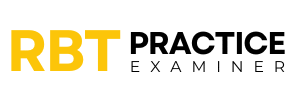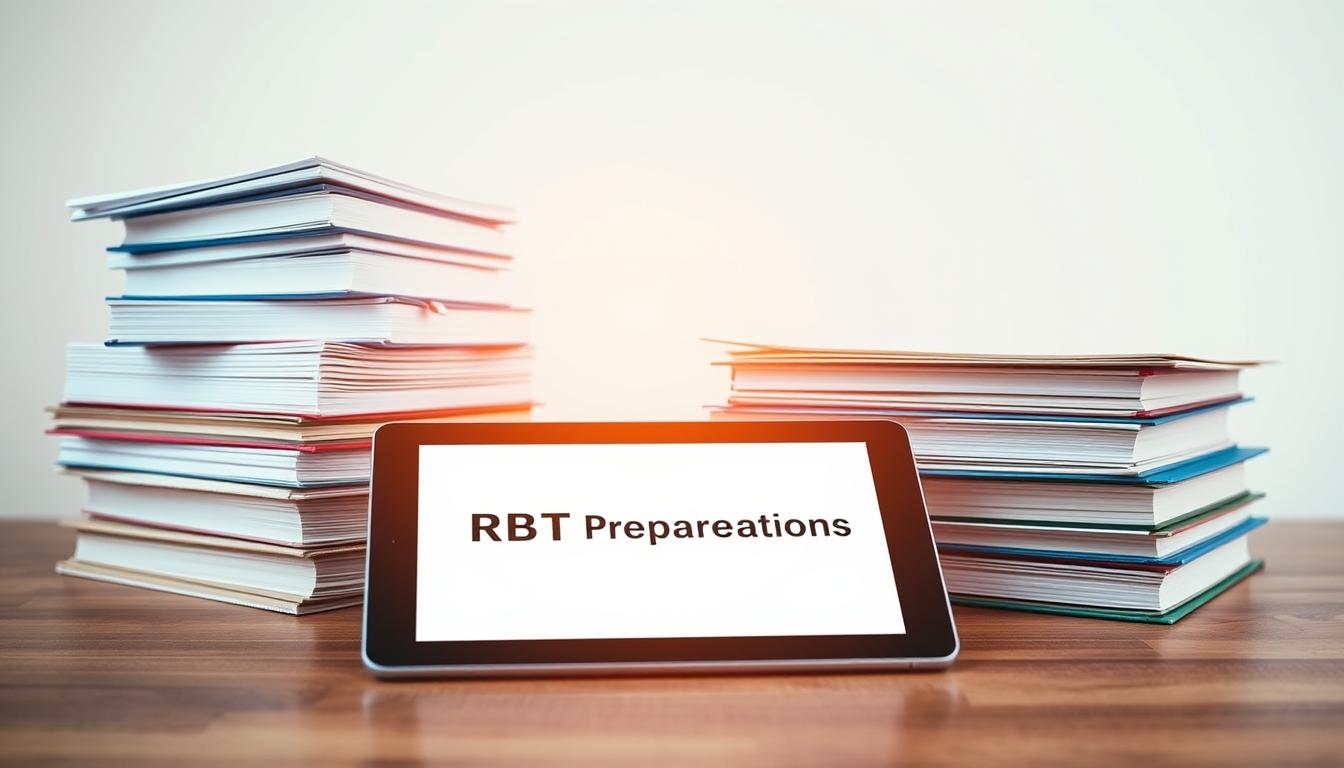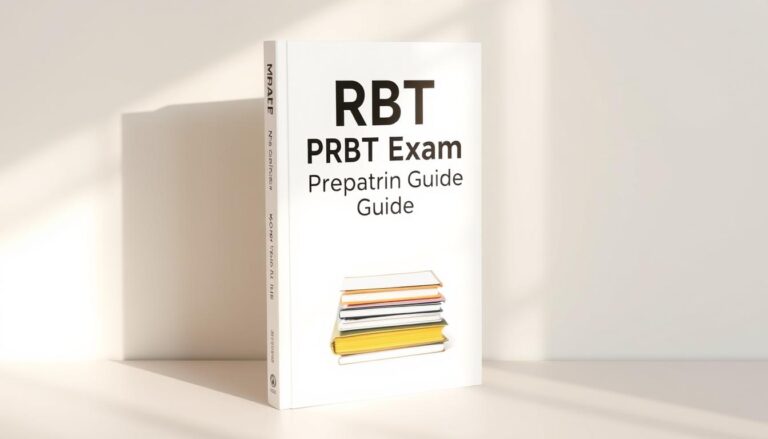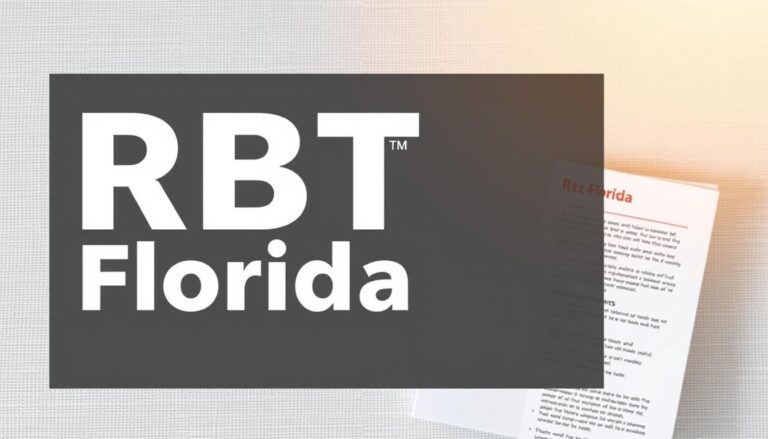Is the RBT Exam Hard? What to Expect
Many aspiring behavior technicians ask: is the RBT exam hard? The Registered Behavior Technician (RBT) exam is a big step for those entering the Applied Behavior Analysis (ABA) field. It checks if a candidate knows how to work with people with developmental challenges.
The RBT exam tests your skills in using key behavioral techniques. You need to show you understand ABA well, can apply it, and know the theory behind it. This is across many areas.
Getting ready for the RBT exam takes hard work and a good plan. Even though it’s tough, with enough study, you can pass. Knowing what the exam covers and what it expects from you is key to passing.
The RBT exam looks at your practical skills and how well you understand ABA. It checks if you can use strategies to reduce bad behaviors, measure things accurately, and keep good records in clinics.
Passing the RBT exam needs good preparation, real-world experience, and a strong ABA knowledge base. If you study well and have confidence, you can show you’re ready to help people with behavioral issues.
Understanding the RBT Exam Basics and Structure
Getting ready for the Registered Behavior Technician (RBT) exam means knowing its layout and parts. Many future ABA therapy professionals worry about the exam’s difficulty. Here’s what you need to know about this important test.
Exam Duration and Question Format
The RBT exam checks your skills in applied behavior analysis. It’s a tough 90-minute test with only multiple-choice questions. You’ll face:
- About 80-85 questions in total
- 40 questions that count towards your score
- 40-45 questions that are for testing new questions
Core Content Areas
Knowing the main topics is key to tackling the RBT exam. The main areas include:
- Measurement and Assessment
- Behavior Reduction Strategies
- Documentation and Reporting
- Professional Conduct and Ethical Considerations
Testing Environment Requirements
The testing environment is vital for ABA therapy certification. The RBT exam is usually taken online. You’ll need:
- A quiet, private place to test
- A stable internet connection
- Government-issued photo ID
- A clear webcam for monitoring
Knowing these requirements early can help you feel more prepared. Understanding the exam well can lower your stress and boost your score.
Is the RBT Exam Hard? Breaking Down the Challenge
Many wonder if the RBT exam is tough. The process is challenging but doable with good prep. Getting ready for the exam is a big part of becoming a behavior technician.
The exam’s tough because of several reasons:
- It needs a lot of knowledge
- It tests how well you apply ABA principles
- You must understand how to use behavioral strategies
- It checks if you can use what you know in real life
Candidates need to really get applied behavior analysis. The exam looks at more than just memorizing. It also checks your ability to think critically, which is key for being a good behavior technician.
| Exam Challenge Area | Difficulty Level | Key Skills Tested |
|---|---|---|
| Measurement Techniques | Moderate | Data collection accuracy |
| Behavior Intervention | High | Strategic problem-solving |
| Ethical Considerations | Moderate | Professional decision-making |
Success depends on thorough study and hands-on experience. Though it’s tough, the RBT exam makes sure only the best get into applied behavior analysis.
Getting ready is essential. Students who put in the effort to learn well usually find the exam easier. Using smart study methods and gaining practical experience helps a lot.
RBT Exam Pass Rates and Statistics
Knowing the rbt exam pass rate is key for those aiming to be Registered Behavior Technicians. The RBT board exam is a big step in a career in behavioral therapy. It has specific metrics that help candidates know what to expect.
Now, let’s look at the important stats that show how well people do on the exam and how to succeed.
First-Time Test Taker Success Rates
Recent data shows some interesting facts about RBT exam results for first-timers:
- About 65-70% of first-time test takers pass the RBT board exam
- Success rates can change based on how well you prepare and study
- Those who do thorough training programs tend to pass more often
Common Reasons for Failure
Knowing why some people struggle can help others avoid the same issues:
- Not studying enough
- Not having enough experience in applied behavior analysis
- Feeling too anxious or struggling with time management
- Not fully understanding key concepts in behavioral intervention
Retake Statistics
The rbt board exam lets you try again if you don’t pass at first:
| Attempt Number | Pass Rate | Average Improvement |
|---|---|---|
| First Attempt | 67% | baseline |
| Second Attempt | 78% | 16% improvement |
| Third Attempt | 85% | 27% improvement |
These numbers show that keeping at it and studying well can really help your score. Seeing setbacks as chances to learn is important.
Required Prerequisites for Taking the RBT Board Exam
Starting a career as a Registered Behavior Technician (RBT) means you must meet certain requirements before the RBT board exam. It’s important to prepare well to qualify for this key certification in behavior technician training.
The main requirements for the RBT board exam are:
- Minimum age of 18 years
- High school diploma or equivalent educational credential
- Completion of a 40-hour RBT training program
- Passing a background check
- Direct supervision by a Board Certified Behavior Analyst (BCBA)
Getting the right education is key for passing the RBT board exam. The 40-hour training program teaches essential skills in applied behavior analysis. It gives candidates the basic knowledge needed to work with people who need behavioral support.
Background checks are a big part of getting certified. These checks make sure clients are safe when they get behavioral intervention services. To be eligible for RBT certification, candidates must have a clean background.
Supervision is also very important in behavior technician training. Every RBT must work under a qualified BCBA’s direct supervision. The BCBA will watch their work and give them ongoing guidance as they grow professionally.
Future RBTs should check all the prerequisites and get ready to show they meet them before taking the RBT board exam. Good preparation boosts your chances of getting certified and starting a fulfilling career in healthcare.
Essential Topics Covered in the RBT Examination
The registered behavior technician exam checks important skills in applied behavior analysis. Those aiming for ABA therapy certification need to know the main parts that show they can handle behavioral interventions well.
To pass, you must know a lot about how to assess and help clients. The test sees if you can use proven ways to manage behavior and support clients.
Measurement and Assessment Strategies
Measurement is key in the RBT exam. You need to show you’re good at:
- Getting accurate behavioral data
- Knowing different ways to measure
- Using exact tracking methods
- Understanding behavioral observations
Behavior Reduction Techniques
The ABA therapy certification exam looks at your skills in making behavior reduction plans. Important areas include:
- Finding target behaviors
- Creating plans for intervention
- Using positive reinforcement
- Watching how behavior changes
Documentation and Professional Reporting
Good documentation is vital in behavioral health. The exam checks if you can:
- Write clear, short progress reports
- Follow ethical standards in documentation
- Talk well with supervisors
- Keep client information private
Knowing these key topics will help a lot in getting ready for the RBT exam. It will also boost your skills in ABA therapy.
Proven Study Strategies for RBT Exam Success

Getting ready for the RBT exam needs a smart plan. It’s not just about reading books. You need a plan that covers all learning styles and what the exam asks.
Having a clear study schedule is key. Break your study into smaller parts, focusing on different topics each week. Make sure to set aside specific times for studying and keep to it.
- Develop a detailed study timeline
- Identify your strongest and weakest subject areas
- Set realistic daily and weekly study goals
Practice tests are a big help. They mimic the real exam and show where you need to improve. The BACB says using official study materials is the best way to prepare.
- Take multiple practice exams
- Review incorrect answers thoroughly
- Time yourself during practice sessions
Learning with others can really boost your exam prep. Join study groups or online forums for RBT exam prep. Talking and sharing with others can make complex ideas clearer.
Use a variety of study tools, like:
- Official BACB study guides
- Online video tutorials
- Flashcards for key terms
- Interactive online practice modules
Remember, steady and focused study is the way to pass the RBT exam. Stay motivated, keep a positive outlook, and believe in your study plan.
Common Mistakes to Avoid During RBT Test Preparation
Getting ready for the RBT exam needs careful planning and focus. Many people accidentally hurt their chances by making big mistakes while studying. Knowing these common errors can really help you pass the test.
To do well on the RBT test, you need a solid plan that’s more than just reading books. Many candidates fall into traps that hurt their scores.
Time Management Errors
Managing your time well is key to doing well on the RBT exam. Common mistakes include:
- Putting off studying until the last few weeks
- Having an uneven study schedule
- Spending too much time on easy topics
- Ignoring hard subjects
Study Material Selection
Picking the right study materials is vital. Avoid these mistakes:
- Using old or incomplete study guides
- Only using one source of information
- Ignoring the BACB® recommended resources
- Not using practice materials that match the real exam
Practice Test Approach
Practice tests are not just for guessing how you’ll do. They are key to learning and finding what you don’t know. Important strategies include:
- Seeing practice tests as chances to learn
- Studying wrong answers carefully
- Practicing under real exam conditions
- Using many practice tests from different places
By knowing and fixing these common mistakes, you can make a better study plan. This will help you do your best on the RBT exam.
What to Expect on Exam Day
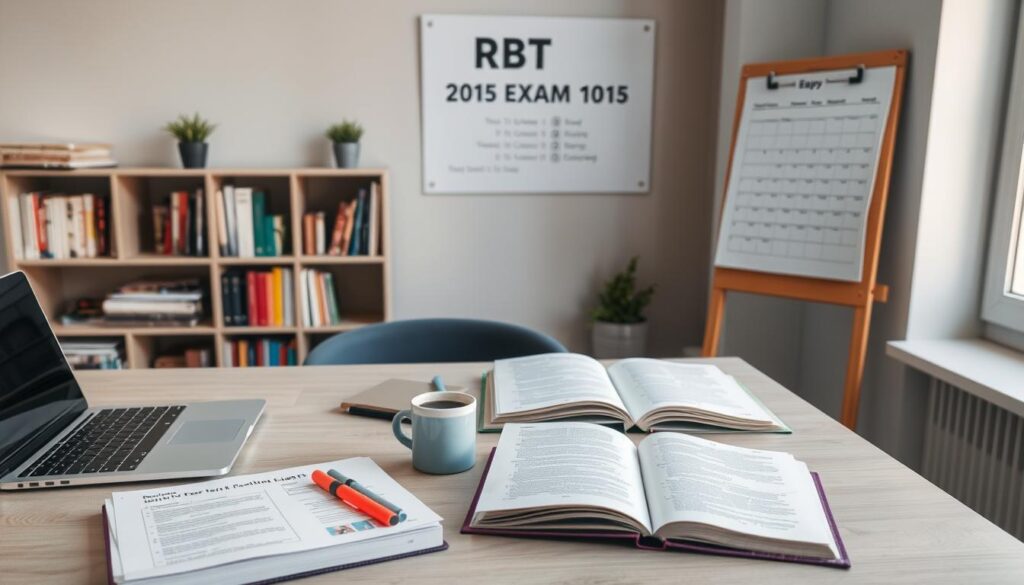
Getting ready for the registered behavior technician exam can be tough. Knowing what to expect on exam day can make you feel less stressed and more confident. This is key for passing this important professional test.
Before you go to the testing center, make sure you have everything you need for your RBT exam. With the right prep, you can handle the exam’s challenges.
- Bring two forms of valid government-issued photo identification
- Arrive at least 30 minutes before your scheduled exam time
- Wear comfortable, professional clothing
- Bring approved calculator (if permitted)
During the exam, you’ll face multiple-choice questions that test your knowledge of applied behavior analysis. The testing area will have:
- Secure check-in process
- Biometric verification
- Personal item storage
- Computer-based testing platform
To deal with test anxiety, try deep breathing and stay positive. Remember, thorough preparation is your best strategy for success.
Important tips for exam day include staying hydrated, getting enough sleep the night before, and arriving early. Your prep will help you face the exam with confidence.
Critical Skills Assessment Components
The RBT exam checks key skills needed for success in behavior technician training and aba therapy certification. Candidates must show they can apply and understand Applied Behavior Analysis (ABA) principles.
Success in the exam needs a mix of hands-on skills and deep knowledge. It looks at many areas of professional skill.
Practical Applications in ABA
The practical skills part of the exam tests how well candidates can use behavior intervention strategies in real life. They need to:
- Use techniques to reduce behavior
- Collect accurate data during interventions
- Communicate well with clients and supervisors
- Follow ethical guidelines in different situations
Theoretical Knowledge Evaluation
The theoretical part of the exam checks how well candidates understand ABA principles. It tests their knowledge of the basics through a detailed exam.
| Skill Domain | Assessment Focus | Weight in Exam |
|---|---|---|
| Measurement | Data collection techniques | 25% |
| Behavior Reduction | Intervention strategies | 30% |
| Ethical Considerations | Professional conduct | 15% |
| Documentation | Reporting and record-keeping | 20% |
The RBT exam requires a nuanced understanding of ABA principles. Candidates must show they can apply their knowledge in real situations for aba therapy certification.
Time Management Tips for the RBT Examination

Mastering time management is key to success in your RBT exam. Good rbt exam tips can change how you feel about the test. It can make you more confident.
Getting through the RBT exam needs a plan and knowing how to use your time. Smart rbt test prep means knowing how to split your time among different types of questions.
- Set aside specific times for each part of the exam
- Practice fast elimination of wrong answers
- Learn smart guessing methods
- Read each question carefully before answering
Good time management can really help your score. Focus on questions you can answer fast and with confidence. Then, go back to the harder ones.
| Exam Section | Recommended Time Allocation | Strategy |
|---|---|---|
| Multiple Choice Questions | 1-1.5 minutes per question | Quick elimination of incorrect options |
| Applied Behavior Analysis | 25-30% of total exam time | Focus on core theoretical concepts |
| Practical Applications | 35-40% of total exam time | Demonstrate practical understanding |
Experts say to practice with timed mock exams. This helps you get better at managing your time. It also makes you feel more ready for the real test.
Remember, time is very important in the RBT exam. Have a plan, stay calm, and trust your hard work.
Resources and Materials for Effective Preparation
Getting ready for the RBT exam needs a smart plan for picking study materials. A detailed rbt exam study guide can greatly help your prep. It’s important to find top-notch resources that cover everything you need to know for the exam.
The Behavior Analyst Certification Board (BACB) has key materials for prep. These include:
- Official RBT Task List
- BACB Handbook
- Ethical Guidelines documentation
There are also other great resources to help you study:
- Comprehensive Study Guides: Find books made just for RBT exam prep
- Online Practice Tests: Sites that mimic the real test
- Video Training Modules: Videos that explain tough topics clearly
Digital tools have changed how we study for the RBT exam. Good websites have online courses, practice questions, and interactive lessons. These digital tools are great for those with tight schedules.
When picking study materials, look for ones that:
- Match the latest BACB task list
- Give clear explanations of behavior analysis
- Have lots of practice questions and mock tests
Choosing the right study materials is key to passing. Mix different resources to fit your learning style and cover all exam topics.
Real Experiences from Certified RBT Professionals
Taking the RBT exam can be tough. Hearing from those who passed can offer great insights. Many certified RBTs talk about the challenges and how they got through them.
Those who passed the RBT exam often point to key strategies. They say things like:
- Keeping a regular study schedule
- Using many study resources
- Practicing with mock exams
- Knowing what the pass rate is
Success Stories That Inspire
Sarah Martinez, a certified RBT from California, shared her journey. She worked hard, using all the study materials and applying what she learned.
Learning from Professional Challenges
Knowing why the RBT exam is tough helps you prepare better. Experts say it’s key to understand applied behavior analysis deeply. Don’t just memorize facts.
| Challenge | Recommended Strategy |
|---|---|
| Complex Theoretical Concepts | Create visual mind maps and study groups |
| Time Management | Practice timed mock exams |
| Practical Application | Seek supervised practical experience |
The RBT exam pass rate might seem scary, but with the right prep, you can succeed. Experts stress the need to know the exam’s core skills and stay positive while studying.
Conclusion
The registered behavior technician exam is a key step for those starting in Applied Behavior Analysis. Knowing how hard the RBT exam is is key to getting ready and passing. It’s tough, but with the right plan, study, and knowledge, you can do it.
The RBT exam doesn’t just test what you know. It also checks how well you can use what you’ve learned. To prepare well, focus on learning how to assess and reduce behaviors. Also, practice making professional documents. Good study materials and practice tests can really help you pass.
Becoming a Registered Behavior Technician takes hard work and dedication. It’s not just about passing a test. It’s about wanting to help people with special needs. Every study session brings you closer to helping others.
Success in the RBT exam comes from good preparation and understanding the exam. Your love for helping others and your drive to grow will help you through this important step in your career.
